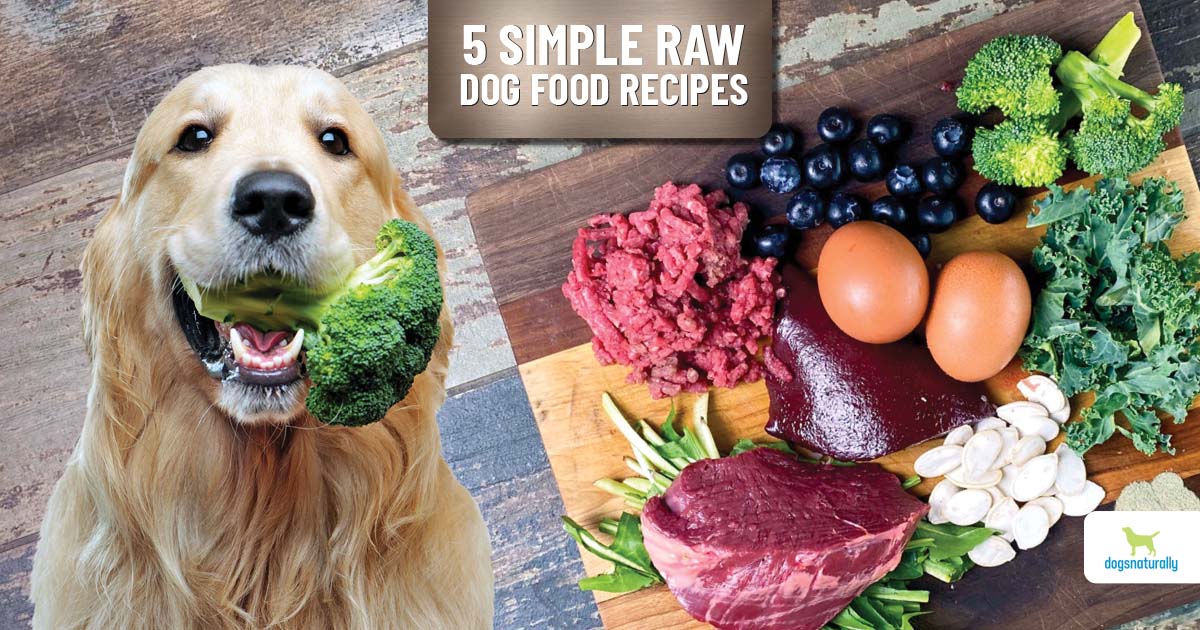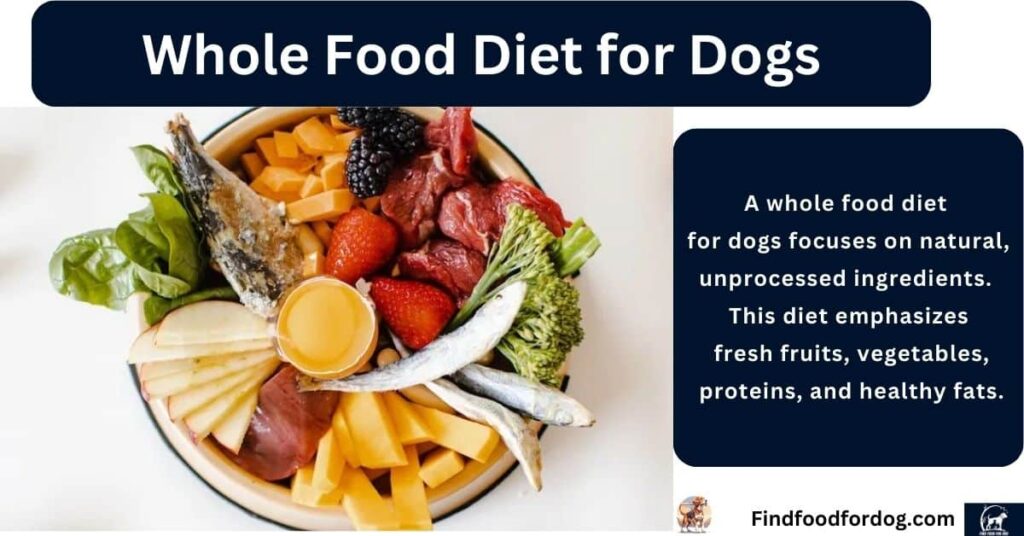A whole food diet for dogs focuses on natural, unprocessed ingredients. This diet emphasizes fresh fruits, vegetables, proteins, and healthy fats.
A whole food diet for dogs offers numerous health benefits. It promotes better digestion, healthier skin, and improved energy levels. By incorporating fresh, nutrient-dense ingredients, pet owners can enhance their dog's overall well-being. Whole foods provide essential vitamins and minerals, reducing the risk of chronic diseases.
This diet avoids fillers and artificial additives commonly found in commercial dog foods. Many dogs respond positively to the taste of whole foods, making mealtime enjoyable. As more pet owners seek healthier options, the whole food approach gains popularity. Understanding the basics of this diet helps ensure your dog receives balanced nutrition for a long, happy life.
Introduction To Whole Food Diet For Dogs
A whole food diet for dogs focuses on natural, unprocessed ingredients. This diet includes fresh fruits, vegetables, and high-quality proteins. Many pet owners are shifting to this approach. They want healthier options for their furry friends.
The Basics Of A Whole Food Diet
A whole food diet consists of real food. Here are the main components:
- High-quality proteins: Chicken, beef, or fish
- Fruits: Blueberries, apples, or bananas
- Vegetables: Carrots, sweet potatoes, or spinach
- Healthy fats: Olive oil or fish oil
These ingredients provide essential nutrients. They help maintain energy levels and overall health.
Benefits For Canine Health
A whole food diet offers numerous benefits for dogs. Here are some key advantages:
| Benefit | Description |
|---|---|
| Improved digestion | Natural ingredients support a healthy gut. |
| Healthy skin and coat | Rich in omega fatty acids, promoting shine. |
| Increased energy | Quality proteins fuel daily activities. |
| Weight management | Whole foods help maintain a healthy weight. |
Pet owners notice changes quickly. Dogs feel livelier and healthier. A whole food diet is a great choice for your dog.

Customize Homemade Dog Food
Key Components Of A Whole Food Diet
A whole food diet for dogs focuses on natural ingredients. This approach promotes better health and well-being. Understanding its key components helps in creating balanced meals.
Proteins: Building Blocks Of Health
Proteins are crucial for your dog's growth and repair. They support muscle development and immune function. Include high-quality protein sources in their diet.
- Chicken: Rich in essential amino acids.
- Beef: Packed with iron and zinc.
- Fish: Provides omega-3 fatty acids.
- Eggs: A complete protein source.
Choose lean meats to avoid excess fat. Rotate protein sources for variety. This ensures a well-rounded diet.
Vegetables And Fruits: Vitamins And Minerals
Vegetables and fruits add vital nutrients to your dog's diet. They provide essential vitamins and minerals. Aim for a colorful mix of produce.
| Vegetable/Fruit | Benefits |
|---|---|
| Carrots | Good for vision and dental health. |
| Spinach | Rich in iron and antioxidants. |
| Blueberries | High in antioxidants and fiber. |
| Sweet Potatoes | Great source of beta-carotene. |
Wash and chop vegetables and fruits before serving. Avoid toxic foods like grapes and onions. Balance is key for optimal health.
Healthy Fats: Essential For Energy
Healthy fats provide energy and support skin health. They help with nutrient absorption. Include good fat sources in your dog's meals.
- Fish Oil: Boosts coat health and reduces inflammation.
- Flaxseed Oil: Great source of omega-3 fatty acids.
- Coconut Oil: Supports digestion and skin health.
Use fats in moderation. Too much can lead to weight gain. Balance is essential for your dog's overall health.
Transitioning Your Dog To A Whole Food Diet
Switching your dog to a whole food diet can be rewarding. It promotes better health and energy levels. Gradual transition is key to avoid digestive issues. Follow a structured plan to make this change smooth.
Step-by-step Transition Plan
Start the transition over a week or two. This helps your dog adjust. Use the following steps:
- Days 1-2: Mix 10% whole food with 90% current food.
- Days 3-4: Increase to 25% whole food and 75% current food.
- Days 5-6: Change to 50% whole food and 50% current food.
- Days 7-8: Adjust to 75% whole food and 25% current food.
- Day 9: Serve 100% whole food diet.
Monitor your dog's response during each phase. Adjust portions based on your dog’s size and activity level.
Monitoring Your Dog's Reaction
Observe your dog closely. Look for any changes in behavior or health. Signs to watch for include:
- Digestion: Check for loose stools or constipation.
- Energy levels: Notice any increase or decrease.
- Skin and coat: Look for improvements or irritations.
- Appetite: Ensure your dog enjoys the new food.
Keep a journal of your dog's reactions. This helps track progress. If issues arise, consider slowing the transition. Consult your veterinarian if problems persist.
Homemade Vs. Commercial Whole Food Diets
Choosing between a homemade or commercial whole food diet for your dog is essential. Each option has unique benefits and drawbacks. Understanding these can help you make the best choice for your furry friend.
Pros And Cons Of Homemade Diets
Homemade diets provide control over ingredients. You can ensure high-quality, fresh items. However, there are pros and cons to consider:
| Pros | Cons |
|---|---|
| Customizable to your dog's needs | Time-consuming to prepare |
| Fresh ingredients | Possible nutritional imbalances |
| No additives or preservatives | Requires research and planning |
| Can accommodate allergies | Higher costs for quality ingredients |
Consider these factors carefully. A homemade diet may suit some dogs better than others.
How To Choose The Right Commercial Food
Selecting the right commercial whole food diet is crucial. Here are steps to guide your choice:
- Check the ingredients: Look for high-quality proteins and whole grains.
- Avoid fillers: Stay away from artificial additives and by-products.
- Read reviews: Research brands for quality and customer satisfaction.
- Consult your vet: Get professional advice tailored to your dog's needs.
- Consider your budget: Find a balance between quality and affordability.
Choosing the right food impacts your dog’s health. Make informed decisions to ensure a happy, healthy pet.
Supplements To Enhance A Whole Food Diet
A whole food diet for dogs can provide many benefits. However, some dogs may need extra support. Supplements can fill nutritional gaps and boost overall health. Understanding when and how to use them is essential.
When Supplements Are Necessary
Some dogs may not get all nutrients from food alone. This can happen due to:
- Health issues
- Age-related needs
- Food allergies
- Specific breed requirements
Consult a veterinarian to determine your dog's needs. Regular health checks help identify any deficiencies.
Choosing The Right Supplements
Selecting the right supplements can be tricky. Consider the following factors:
- Quality: Choose reputable brands.
- Ingredients: Look for natural components.
- Specific Needs: Match supplements to your dog’s health concerns.
Common supplements include:
| Supplement | Benefits |
|---|---|
| Omega-3 fatty acids | Supports skin, coat, and joint health. |
| Probiotics | Improves digestion and gut health. |
| Multivitamins | Fills nutrient gaps in the diet. |
| Joint supplements | Helps with mobility and joint health. |
Monitor your dog’s response to any supplements. Adjust dosage as needed. Always discuss changes with your vet.
Common Myths And Misconceptions
Many dog owners hold misconceptions about a whole food diet. These myths can confuse pet parents. It's important to separate fact from fiction. Let’s explore some common myths and provide clarity.
Debunking Whole Food Diet Myths
Here are some myths about whole food diets for dogs:
- Myth 1: Whole food diets are too expensive.
- Myth 2: Only commercial dog food is balanced.
- Myth 3: Whole foods cause allergies in dogs.
Truth: Whole food diets can be affordable. Many whole foods are inexpensive and healthy. It's possible to create balanced meals at home. Furthermore, many dogs thrive on these diets.
Many commercial dog foods lack quality ingredients. Whole foods offer natural nutrition. Dogs can eat various fruits, vegetables, and meats. A balanced diet can be achieved without commercial products.
The Truth About Grains And Other Ingredients
Many believe grains are harmful to dogs. This is not entirely true. Here’s what you should know:
| Ingredient | Myth | Fact |
|---|---|---|
| Grains | Grains cause allergies. | Most dogs digest grains well. |
| Vegetables | Dogs can’t eat veggies. | Veggies provide essential nutrients. |
| Fruits | Fruits are too sugary. | Many fruits are safe in moderation. |
Whole grains can offer fiber and energy. Vegetables add vitamins and minerals. Fruits give antioxidants. These ingredients support a dog's overall health.
Incorporating these foods promotes a balanced diet. Always consult a vet when changing your dog's diet.
Success Stories And Testimonials
Many dog owners share their journeys with a Whole Food Diet. Their stories highlight remarkable changes. Dogs thrive on natural, wholesome foods. This section showcases real-life transformations and expert endorsements.
Real-life Transformations
Dogs have undergone amazing transformations on a Whole Food Diet. Owners report increased energy and vitality. Here are some inspiring stories:
- Buddy: A rescue dog, Buddy struggled with obesity. After switching to whole foods, he lost 15 pounds. Now, he runs and plays daily.
- Max: Max had skin allergies. His owner changed his diet to whole foods. His skin cleared up within weeks.
- Luna: Luna, an elderly dog, had joint issues. A whole food diet improved her mobility. She now enjoys long walks with her owner.
| Dog's Name | Before Diet | After Diet |
|---|---|---|
| Buddy | Obese, lethargic | Active, fit |
| Max | Skin allergies | Healthy skin |
| Luna | Joint pain | Improved mobility |
Take advice from Pet Expert Dr Marty
ESA Pet is an online service that helps you get a legitimate ESA letter
Pet vitamin supplements and grooming products
Veterinary Endorsements
Veterinarians support the Whole Food Diet for dogs. They notice significant health improvements. Many recommend natural diets for various reasons:
- Better digestion and nutrient absorption
- Improved coat condition
- Enhanced energy levels
Dr. Smith, a vet with 20 years of experience, states:
“Whole food diets can transform a dog's health. I see positive changes every day.”
Another vet, Dr. Johnson, adds:
“Natural ingredients provide essential nutrients. They boost overall well-being in dogs.”
These endorsements highlight the benefits of a Whole Food Diet. Owners feel reassured knowing experts support their choices.
.webp?width=792&height=1633&name=best-fruits-veggies-raw-food%20(1).webp)
Customize Homemade Dog Food
Maintaining A Whole Food Diet Long-term
Keeping your dog on a whole food diet is rewarding. It helps improve their health and happiness. However, sticking to this diet over time requires planning and commitment.
Tips For Sustainability
Here are some tips to help maintain a whole food diet for your dog:
- Plan meals weekly. Create a menu to avoid confusion.
- Buy in bulk to save money. Use fresh ingredients.
- Batch cook meals. Store them in the freezer for later.
- Rotate proteins to provide variety. Include chicken, beef, and fish.
- Incorporate seasonal produce. This keeps meals fresh and exciting.
Keep track of your dog's weight. Adjust portions as needed. Regular vet check-ups ensure your dog stays healthy.
Adapting The Diet As Your Dog Ages
Your dog's nutritional needs change as they age. Adjust the diet to meet these needs.
Consider these factors:
| Age Group | Diet Focus |
|---|---|
| Puppies | High protein for growth |
| Adults | Balanced diet for energy |
| Seniors | Lower calories, joint support |
Monitor your dog's health closely. Look for signs of weight gain or loss. Adjust food types and amounts accordingly.
Consult your vet for specific dietary changes. This ensures your dog remains healthy throughout their life.
Frequently Asked Questions On Whole Food Diet for Dogs
What Is A Whole Food Diet For Dogs?
A whole food diet for dogs focuses on natural, unprocessed ingredients. This diet includes fresh meats, vegetables, fruits, and grains. It avoids artificial additives and fillers. Whole foods provide essential nutrients and improve overall health. This diet can enhance your dog's energy levels and coat condition.
Why Should I Choose Whole Foods For My Dog?
Choosing whole foods for your dog offers numerous health benefits. Whole foods are nutrient-dense and promote better digestion. They can help prevent obesity and chronic illnesses. Additionally, whole foods support a healthy immune system. A diet rich in whole foods can improve your dog's quality of life.
Can I Make Homemade Whole Food Meals For My Dog?
Yes, you can make homemade whole food meals for your dog. Use fresh ingredients like lean meats, vegetables, and healthy grains. Ensure you include all essential nutrients. Consult with your veterinarian for balanced recipes. Homemade meals can be a great way to control ingredients and enhance your dog's diet.
Are There Any Risks With A Whole Food Diet?
While a whole food diet is beneficial, there are some risks. Inadequate nutrient balance can lead to deficiencies. It's crucial to ensure meals are well-rounded. Always consult your veterinarian before making significant dietary changes. Monitoring your dog's health during the transition is essential for their well-being.
Customize Homemade Dog Food
Conclusion
A whole food diet can significantly improve your dog's health. By focusing on natural ingredients, you'll provide essential nutrients and enhance their well-being. This approach can lead to a happier, more energetic pet. Embrace the benefits of whole foods, and watch your furry friend thrive with every meal.
Your dog deserves the best!


















